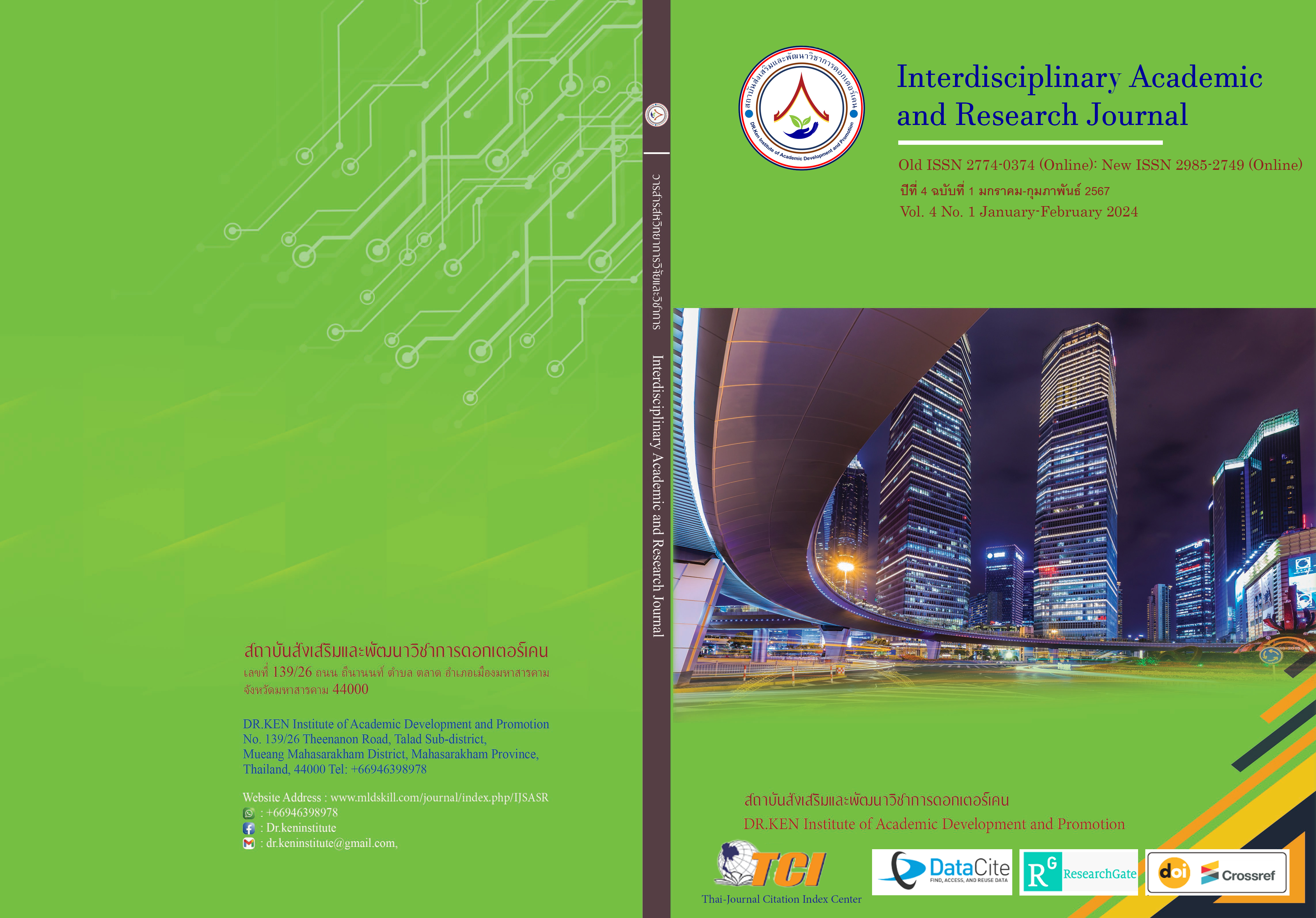Transformational Leadership of Administrators of Phrapariyattidham School of General Education Department Area 11
DOI:
https://doi.org/10.60027/iarj.2024.273478Keywords:
Leadership; , Transformational Leadership; , Phrapariyattidham School on General Education DepartmentAbstract
Background and Aims: Transformational leadership is the process by which leaders influence co-workers or followers. By changing the condition or changing the effort of co-workers or followers to be higher. Develop the abilities of co-workers or followers to a higher level and have more potential. The purposes of this research were to 1) Study the transformational leadership of Phrapariyattidhamma School administrators, general division, Area 11, and 2) Compare the transformational leadership of administrators of Phrapariyattidhamma School, General Department, Area 11, classified by educational level and work experience.
Methodology: It is quantitative research. The population used in the research includes 321 teachers of Phrapariyattidhamma School, General Department, Area 11, Academic Year 2566, a sample size of 178 people using the stratified sampling method Research tools include questionnaires. Statistics used in data analysis include frequency, mean, percentage, standard deviation, F-test, and t-test.
Results: (1) Transformational leadership of Phrapariyattidhamma School administrators General Education Department, Area 11, overall is at a high level with an average of 4.137. When considering each aspect, it is found that every aspect is at a high level. The averages were ordered from highest to lowest, with the aspect with the highest average being individuality consideration, with an average of 4.53, followed by the aspect of inspiration, with an average of 4.34, and the aspect with the lowest average. In terms of intellectual stimulation, the average was 4.23. And (2) Teachers have opinions about the transformational leadership of school administrators. Results of comparative analysis of opinions on transformational leadership among school administrators. Classified by education level and work experience overall and each aspect is not different.
Conclusion: The administrators of Phrapariyattidhamma School, General Education Department, Area 11, have transformational leadership with a high average (4.137) in all aspects, such as considering individuality (4.53) and teachers have undifferentiated opinions on this leadership,
Both educational level and work experience
References
กนกอร สมปราชญ์. (2560). ภาวะผู้นำและภาวะผู้นำการเรียนรู้สำหรับผู้บริหารสถานศึกษา. ขอนแก่น : หจก. โรงพิมพ์คลังนานาวิทยา.
ธัญญามาศ แดงสีดา. (2565). ภาวะผู้นำการเปลี่ยนแปลงของผู้บริหารโรงเรียนขยายโอกาสทางการศึกษาสังกัดสำนักงานเขตพื้นที่การศึกษาประถมศึกษาระยอง เขต 1. วิทยานิพนธ์ปริญญาศึกษาศาสตรมหาบัณฑิต การบริหารการศึกษา : มหาวิทยาลัยเกริก.
ธีรศักดิ์ สารสมัคร. (2563). ภาวะผู้นำการเปลี่ยนแปลงของผู้บริหารสถานศึกษาในยุคการศึกษา 4.0 ลังกัดสำนักงานเขตพื้นที่การศึกษามัธยมศึกษา เขต 29. การประชุมวิชาการและนำเสนอผลงานวิจัยระดับชาติ ราชธานีวิชาการ ครั้งที่ 5, วันที่ 9 พฤษภาคม 2563. อุบลราชธานี : มหาวิทยาลัยอุบลราชธานี.
บุญชม ศรีสะอาด. (2553). การวิจัยเบื้องต้น. กรุงเทพฯ : สุวีริยาสาส์น.
พระราชบัญญัติการศึกษาพระปริยัติธรรม. (2562). ราชกิจจานุเบกษา. 16 เมษายน, เล่ม 137.
มสุกรี ตายะกาเร็ง. (2564). ภาวะผู้นำการเปลี่ยนแปลงของผู้บริหารโรงเรียนกับแรงจูงใจในการปฏิบัติงานของครูสังกัดสำนักงานการศึกษาเอกชนจังหวัดยะลา. วิทยานิพนธ์ปริญญาครุศาสตรมหาบันฑิต การบริหารการศึกษา : มหาวิทยาลัยราชภัฏยะลา.
มัทนา วังถนอมศักดิ์. (2561). ภาวะผู้นำทางการศึกษา ทฤษฎีและการปฏิบัติ. นครปฐม : บริษัท เพชรเกษมพริ้นติ้ง กรุ๊ปจำกัด.
รุ้งนภา จันทร์ลี. (2562). ภาวะผู้นำการเปลี่ยนแปลงของผู้บริหารสถานศึกษาที่ส่งผลต่อการเป็น องค์กรแห่งการเรียนรู้ของสถานศึกษาสังกัดสำนักงานเขตพื้นที่การศึกษาประถมศึกษา จันทบุรี เขต 2. วิทยานิพนธ์ปริญญาครุศาสตรมหาบัณฑิต สาขาวิชาการบริหารการศึกษา : มหาวิทยาลัยราชภัฏรำไพพรรณี.
สุกรี สุระคำแหง. (2563). ความสัมพันธ์ระหว่างภาวะผู้นำการเปลี่ยนแปลงของผู้บริหารสถาน ศึกษากับความพึงพอใจในการปฏิบัติงานของครูโรงเรียนเอกชนสอนศาสนาอิสลาม สังกัดสำนักงานการศึกษาเอกชนจังหวัดสงขลา. วิทยานิพนธ์ปริญญาศึกษาศาสตรมหาบัณฑิต การบริหารการศึกษา : มหาวิทยาลัยหาดใหญ่.
Bass, B.M. & Avolio, B.J. (1995). Multifactor Leadership Questionnaire. Redwood City, CA: Mind Garden.
Bass, B.M., & Avolio, B.J. (1994). Improving Organizational Effectiveness Through Transformational Leadership. Newbery Park, CA: Sage.
Bass, B.M. & Riggio, R.E. (2006). Transformational Leadership. 2nd edition. New Jersey: Lawrence Erlbaum Associates.
Burns, J.M. (1978). Leadership. New York: Harper and Row.
Covey, S.R. (2004). The 8th Habit: From Effectiveness to Greatness. New York: Simon & Schuster.
Gibson, J.L., Ivancevich, J.M., & Donnelly, J.H. (2000). Organizations: Behavior Structure Process. Boston: McGraw-Hill.
Krejcie, R.V. & Morgan, D.W. (1970). Determining Sample Size for Research Activities. Educational and Psychological Measurement, 30 (3), 607-610.
Yukl, G.A. (1998). Leadership in organizations. 4thedition. New Jersey: Prentice-Hall.
Yukl, G.A. (2002). Leadership in organizations. 5th edition. New Jersey: Prentice-Hall.
Downloads
Published
How to Cite
Issue
Section
License
Copyright (c) 2024 Chamrat Mungfaoklang, Prasong Songnork, Manatchai Kotchasit, Surawut Kanongmat, Boonrai Ratsantier

This work is licensed under a Creative Commons Attribution-NonCommercial-NoDerivatives 4.0 International License.
Copyright on any article in the Interdisciplinary Academic and Research Journal is retained by the author(s) under the under the Creative Commons Attribution-NonCommercial-NoDerivatives 4.0 International License. Permission to use text, content, images, etc. of publication. Any user to read, download, copy, distribute, print, search, or link to the full texts of articles, crawl them for indexing, pass them as data to software, or use them for any other lawful purpose. But do not use it for commercial use or with the intent to benefit any business.
















.png)


